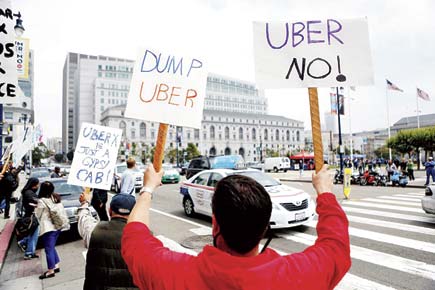When there are wars, rapes are common. The foot soldiers of conquering armies, brutalised by war, rape women in the wake of conquest, and burn the houses of villagers

 When there are wars, rapes are common. The foot soldiers of conquering armies, brutalised by war, rape women in the wake of conquest, and burn the houses of villagers. When we find ourselves surrounded by recurring tales of violence, including sexual violence against women, maybe we should ask what war are we in the middle of?
When there are wars, rapes are common. The foot soldiers of conquering armies, brutalised by war, rape women in the wake of conquest, and burn the houses of villagers. When we find ourselves surrounded by recurring tales of violence, including sexual violence against women, maybe we should ask what war are we in the middle of?

Uber was banned in Delhi after the rape of a young professional in one their cabs. File pic
ADVERTISEMENT
Following the hue and cry over the Uber cab rape in Delhi earlier this month, Uber issued a statement about background checks, saying that these guidelines are currently absent in the government commercial transportation licencing programmes. They have in effect used a conveniently provided government loophole to do a little more ‘aggressive business.’
Is that familiar? Because in 2012, following the Delhi gang rape, a similar discussion ensued. The rape took place in a privately operated public transport bus, and opened up some discussion (perhaps not enough) around the cartels in Delhi’s transportation business, the nexus between politicians, their cronies who get to own and operate public transport vehicles and police. One of the Delhi rapists, back then, too, had a police record.
Despite some push to render these processes of granting licences and permission for commercial transport transparent, nothing much has changed.
It’s not that these issues were never discussed before the gang rape. For instance, in Delhi, the NGO Nyayabhoomi has consistently focused on fundamental systemic issues that plague the auto-rickshaw
system, making it exploitative of poorer drivers and inconvenient at best, hellishly unsafe at worst, for citizens, especially women.
In 2011, Nyayabhoomi, investigating the move to install Global Positioning System (GPS) systems in autorickshaws revealed that “the Transport Department has not even seen the GPS they have specified, they have no mechanism for capturing errant drivers using the GPS, there are no details for the “panic button”, no field trials and there is no address for the much vaunted auto control centre.” That is to say, these GPS systems were in 2011 what women’s toilets or the ban on Uber are in 2014 a way of not discussing certain things while pretending that these things are being addressed.
Before the rape in the Uber cab, there was some discussion around Uber’s functioning and payment systems where several business-friendly folks argued against the RBI’s two-step verification system for credit card payments extending it that old ho-hymn such ‘curbs’ are bad for the economy. In fact, as we know, all curbs are considered bad for the economy and, in fact, many multinationals do not face the same ‘curbs’ or responsibilities towards labour, safety norms, employment practices and so on in India as they do in other countries. Their incentive to help our economy grow comes at the cost of the people of this country. If they are squeamish or curbed by their own countries, they may simply sub-contract the dirty work. Contract labour the cheapest most exploited kind of employment is increasingly the norm and one that brutalises its worker-soldiers, breeds a culture of inter-class suspicion, insecurity, aggression and injustice whether you are a security guard or a media employee. If a government promotes such practices, whether to maintain feudal constituencies and political cronies, or allow international companies cavalier freedoms, they provide for a culture of violence. But of course we are never allowed to question the economy banning Uber (even while it still seems to ply) is just a way of not permitting conversation about policies that shape our public life and safety.
This is a war, on its own people, that our economy carries out, an upside-down democracy, in which this rape and violence are the collateral damage.
Paromita Vohra is an award-winning Mumbai-based filmmaker, writer and curator working with fiction and non-fiction. Reach her at www.parodevi.com. The views expressed in this column are the individual’s and don’t represent those of the paper.
 Subscribe today by clicking the link and stay updated with the latest news!" Click here!
Subscribe today by clicking the link and stay updated with the latest news!" Click here!







